
Phil Nash
Phase 2 of the historic Japanese American campaign for redress got off to a successful start this year during the days surrounding the Day of Remembrance ceremonies that Japanese American communities nationwide commemorate each year around Feb. 19.
On that date in 1942, President Franklin D. Roosevelt signed Executive Order 9066, which set in motion the roundup, forced removal and years-long incarceration of Japanese Americans and Japanese Latin Americans.
One high point was that for the first time in the many years that the nation’s president has issued an official proclamation to mark DOR, President Joe Biden specifically mentioned the former Japanese Latin American internees: “We reflect on the bravery of civil rights leaders like Fred Korematsu, Minoru Yasui, Gordon Hirabayashi and Mitsuye Endo, and that of every Japanese American who organized and sought redress. Their efforts helped bring about the first Day of Remembrance, led President Jimmy Carter to sign the law creating the Commission on Wartime Relocation and Internment of Civilians and spurred President Ronald Reagan to sign the Civil Liberties Act of 1988, which provided monetary reparations to living survivors and an official apology to the Japanese American community.
“At the same time, we also acknowledge the painful reality that Japanese Latin Americans, who were taken from their Central and South American homes and incarcerated by the United States government during World War II, were excluded from the Civil Liberties Act of 1988.”
The signing of the Civil Liberties Act of 1988, which granted redress to Japanese Americans who were citizens and Legal Permanent Residents when they were incarcerated during World War II, excluded Japanese Latin Americans because they did not qualify under such eligibility criteria. Even though they had been seized from their homes in Latin America and interned in the U.S., they were classified as “illegal aliens.”
Now, after a major victory in the Inter-American Commission on Human Rights (IACHR), JLAs are calling upon everyone to build on the gains of Phase 1 of the redress campaign with active support for them during Redress Phase 2: demanding/urging the U.S. government to honor the rule of international law and grant appropriate redress to Japanese Latin Americans.
Another high point was that the JLA wartime experience and ongoing redress struggle were included in the nation’s three-day commemoration of the 80th anniversary of EO 9066, which was sponsored by the National Park Service, Smithsonian Institution and a broad spectrum of the Japanese American community nationwide, including the Japanese American Citizens League (National); Japanese American National Museum; White House Initiative on Asian Americans, Native Hawaiians and Pacific Islanders; Friends of Minidoka; Heart Mountain Wyoming Foundation; National Japanese American Memorial Foundation; JACL-DC; the Asian American Foundation; Densho; Tsuru for Solidarity; Resisters.org; and over 20 community partners (https://www.nps.gov/subjects/japaneseamericanconfinement/day-of-remembrance.htm).
Grace Shimizu, director of the Campaign for Justice: Redress NOW for Japanese Latin Americans! and the Japanese Peruvian Oral History Project, spoke at several DOR events in February, including events at Chabot College (Hayward, Calif.), University of California, Berkeley, University of Maryland, San Francisco State University and Mile High JACL (Denver) (https://jlacampaignforjustice.org/2022-day-of-remembrance/).
On Feb. 24, the JLA Day of Action, people expressed support for JLA redress. Supporters called or wrote messages to the White House to express their support, signed an online petition and invited friends and family to support the Redress Phase 2 campaign (bit.ly/JLADayofAction).
“We were very moved by the outpouring of support from Japanese Americans and many others as we kicked off Redress Phase 2,” said Shimizu. “It has been 80 years since our families were taken from our homes and placed behind barbed wire. Many of our loved ones have already passed away. Time is long overdue for the U.S. government to uphold international law and grant reparations.”
“Giving redress to JLAs is not only the right thing to do,” said Margaret Fung, executive director of the Asian American Legal Defense and Education Fund, an early supporter of Redress Phase 2, “[but] it also reminds us that we must be vigilant about our civil rights and civil liberties in all times — especially in times of war and national crises.”
For more details about Redress Phase 2, please visit https://jlacampaignforjustice.org.
Professor Phil Tajitsu Nash is co-president of the Asian American Legal Defense and Education Fund and teaches Asian American Studies at the University of Maryland. He participated in Phase 1 of the redress movement as a lawyer at AALDEF, a board member of the New York JACL, a researcher at the National Archives with Jack and Aiko Herzig-Yoshinaga, a lobbyist for the Washington Coalition on Redress and a reporter at the NY Nichibei and other community papers.



